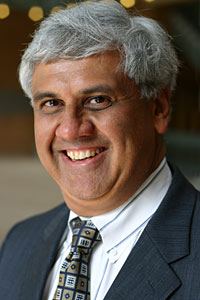UC Berkeley Press Release
S. Shankar Sastry named new dean of engineering
BERKELEY – S. Shankar Sastry, NEC Distinguished Professor and former chair of the Department of Electrical Engineering and Computer Sciences at the University of California, Berkeley, has been appointed the campus's new dean of the College of Engineering.
His appointment was approved today (Thursday, July 19) by the UC Board of Regents and is retroactive to July 1.
 S.Shankar Sastry (Aaron Walburg/CITRIS photo) |
Sastry's research expertise falls into a number of areas, including embedded and autonomous software, computer vision, robotic telesurgery, cybersecurity, control of hybrid systems, sensor networks and biological motor control.
"Shankar Sastry will be an outstanding engineering dean for Cal," said UC Berkeley Chancellor Robert J. Birgeneau. "A technology visionary, he has a tremendous record of achievement leading large organizations and advancing our knowledge of intelligent systems to improve high-impact areas, such as health care and security."
Sastry, who holds joint faculty appointments with the bioengineering and mechanical engineering departments, takes the helm of a college that is regularly ranked among the top three engineering programs in the nation. The college is home to more than 4,200 graduate and undergraduate students and has a research budget of approximately $120 million.
"Berkeley Engineering is a fountain of innovation, playing a major role in transforming our world through technology," said Sastry. "Serving as dean will be a labor of love, because I care so deeply for this institution."
Sastry, 51, will become the 12th dean of the college, succeeding former engineering dean A. Richard Newton, who died this past January, less than two months after being diagnosed with pancreatic cancer.
Sastry received his Bachelor of Technology degree from the Indian Institute of Technology in Bombay, India, the same city where he was born. His affiliation with UC Berkeley began as a graduate student, earning a master's degree here in electrical engineering and computer sciences in 1979 and another in mathematics in 1980.
He received his UC Berkeley Ph.D. in electrical engineering and computer sciences in 1981, spent two years as an assistant professor at the Massachusetts Institute of Technology, and then returned to UC Berkeley as an assistant professor in 1983.
Sastry has held numerous leadership positions at UC Berkeley, most recently as director of the Center for Information Technology Research in the Interest of Society (CITRIS) and the Banatao Institute@CITRIS Berkeley.
CITRIS is one of four California Institutes for Science and Innovation established in 2001 to develop the next generation of technologies that will be critical to sustaining California's economic growth and global competitiveness.
Sastry also served as director of the Information Technology Office of the Defense Advanced Research Projects Agency in the U.S. Department of Defense. The responsibilities of that office included planning and managing the investment in all areas of information technology.
He recently led the organization of both a multi-university cybersecurity research consortium and a testbed for network defense, called the Cyber Defense Technology Experimental Research Network (or cyber DETER Network). In 2003, the National Science Foundation awarded $5.46 million to fund the project.
Sastry has garnered a number of honors, including a National Science Foundation Young Investigator Award, a distinguished Alumnus Award of the Indian Institute of Technology, and the President of India Gold Medal. In 2001, he was elected to the National Academy of Engineering, and in 2004, he was elected to the American Academy of Arts and Sciences.
Salary information for the new dean position is available on the University of California website.
He is married to Claire Tomlin, a UC Berkeley professor of electrical engineering and computer sciences, who last year won a coveted $500,000 MacArthur Foundation "genius" fellowship for her work in hybrid control systems that address problems in aircraft flight control and collision avoidance. Tomlin also holds the Arlene and Vance Coffman Chair of Aeronautics and Astronautics at Stanford University.

